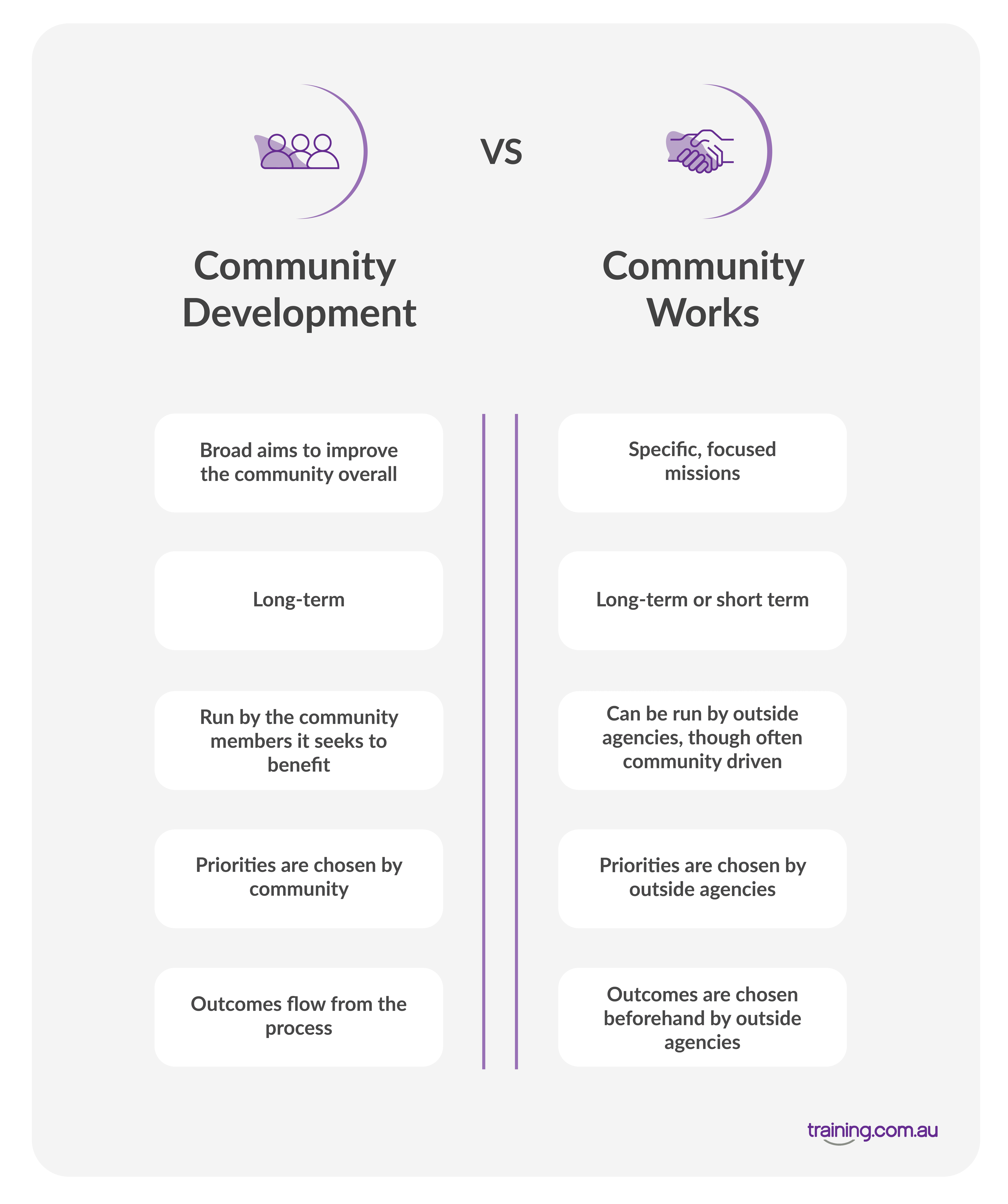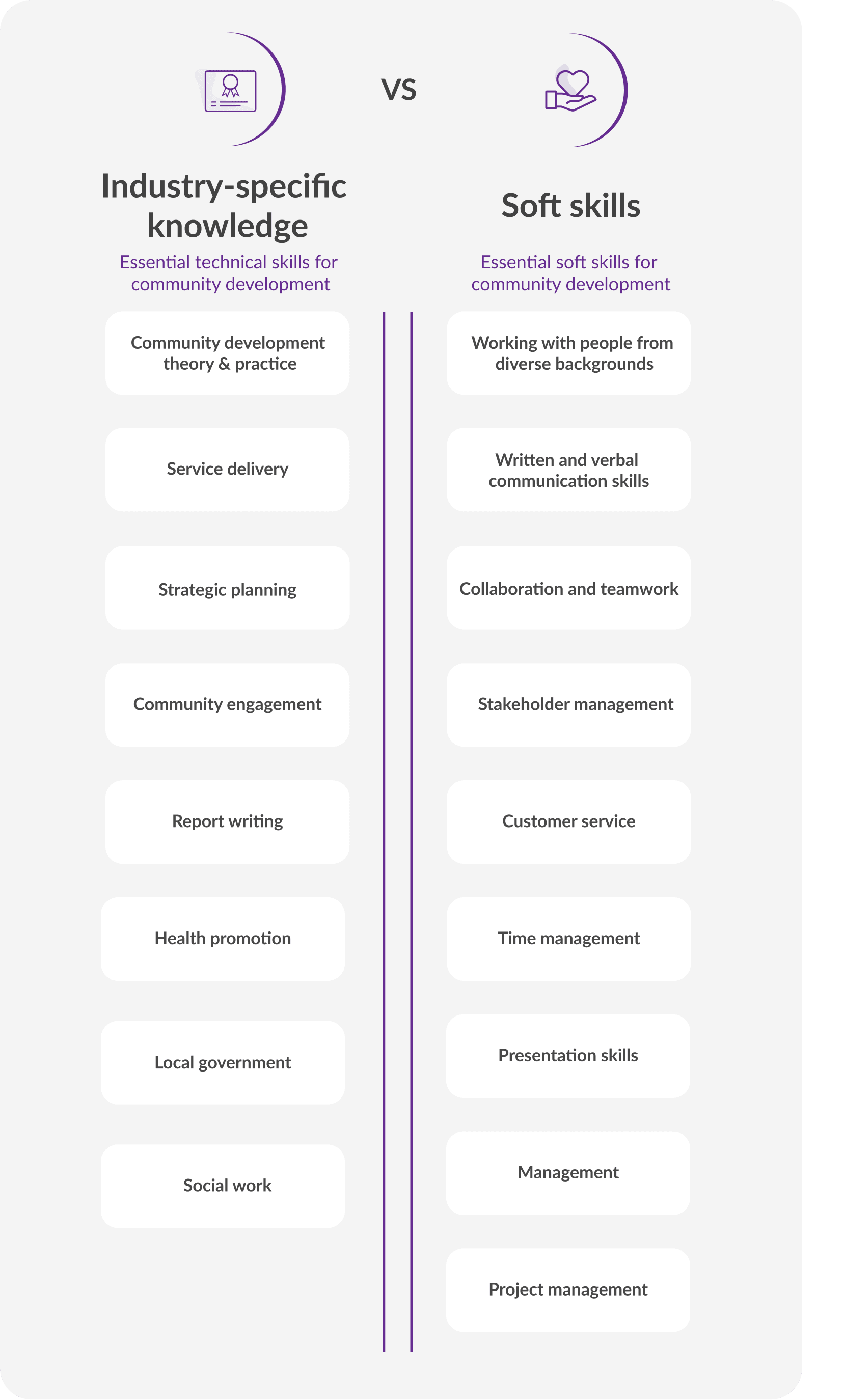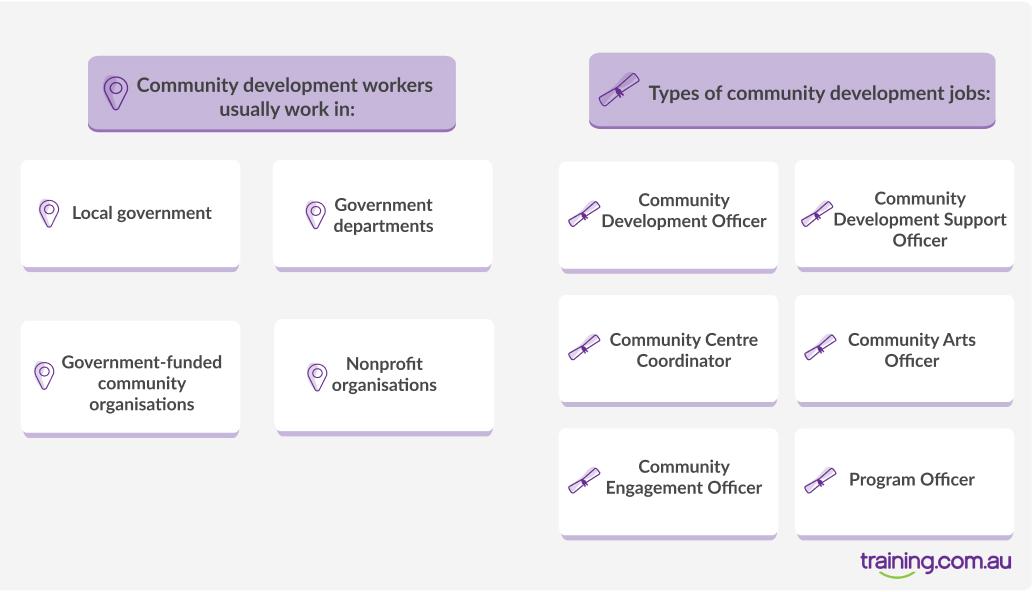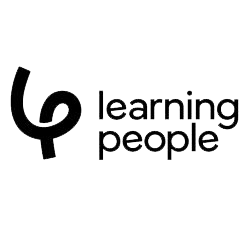- Why study community development?
- Principles of community development
- 1. You’ll make a lasting difference
- 2. You’ll be more fulfilled at work
- 3. The skills you learn will open doors
- Industry-specific knowledge
- Soft Skills
- 4. Getting qualified is an investment in your future
- 5. You can walk your own path
- Community development courses
- Browse Community Services Results
5 Reasons a Community Development Career is Perfect for You

- Why study community development?
- Principles of community development
- 1. You’ll make a lasting difference
- 2. You’ll be more fulfilled at work
- 3. The skills you learn will open doors
- Industry-specific knowledge
- Soft Skills
- 4. Getting qualified is an investment in your future
- 5. You can walk your own path
- Community development courses
- Browse Community Services Results
Looking for a job where you can live your values? Believe in empowering people? Find out how to start a rewarding, stable career in community development.
The community sector is broad, and roles for community workers are quite diverse, but they all aspire to create social change and improve the world we live in. As one of the most fascinating parts of the community services sector, community development is two things: an approach, and a profession. You can feel confident that working in this area is a proven way to create deep, long-lasting, sustainable change from the ground up.
Why study community development?
Community development is an effective approach that’s all about working alongside people in vulnerable communities, and empowering them to improve their own lives and help themselves. Building resilient communities enables us to support each other, to band together in hard times, and to grow into a better society.
Here are five reasons why you should get into this brilliant, fulfilling field.
Principles of community development
When it comes to communities, there’s no one-size-fits-all solution. For that reason, there’s no one set of steps to follow when working in community development. Instead, you’ll take a community-led approach, with these principles as your guiding star:
Human rights
Inclusion
Social justice
Self-determination
Collective action
Sources: International Association for Community Development & What is community development?
Child Family Community Australia
1. You’ll make a lasting difference
Do you feel a calling to make the world a better place? We all need to work to survive, but what if you want more from life than the typical nine to five? Finding a job that makes a difference and fulfils you can be tough.
Especially if you dread being stuck in an office, chained to a desk, and you’d rather be out there, actually talking to people and making things happen — and you want something you can get stuck into now, rather than after years of rigorous study.
What is community development?
Community development is a sensitive and supportive approach to working with communities. It aims to create a fairer, more inclusive society by getting to the root causes of unfair disadvantages and thinking long-term.
Community development aims to enable people to create positive social changes in their communities through education, resourcing, and relationship building.
Community development lies at the overlap of two fields that aim to make a better world: community services and sustainable development.
It’s based on the idea that the best way to make a difference is to empower people to help themselves. Research has shown that, across the world, the most effective development projects heavily involve the community in all stages.
So, you get the best of both worlds: directly helping real people in local communities, while also driving deep, long-lasting change.
When we talk about communities, it can refer to:
Location
People that live in particular places, such as towns or cities.
Groups of people with a shared identity or interest
Such as cultural/ethnic/religious groups, at-risk young people, or LGBTQIA+ people.
How does it work?
Community development is a ‘bottom-up approach, which means that projects are designed and carried out by people in the community, rather than outside ‘experts’. This means more than just consulting with community members: it means that a project is initiated, led and carried out by the community members themselves.
In community development, you must approach each situation differently, and work with community members to find out what matters to them, and then support them to make it happen — rather than deciding what people need, and then delivering it to them.
Community development seeks to:
What it isn’t:
2. You’ll be more fulfilled at work
Community development is more than just a job: it’s a calling, and it takes someone with an abundance of warmth and empathy. If you’re a people person with a passion for justice and helping others, you will thrive in this role.
The role of a community development worker
As a community development professional, your aim is to empower the community to come together and create the change they want to see. Each community will be different — with different strengths, needs, and problems. Your job is to be a facilitator, helping to identify needs and removing obstacles. During your work with the community, you’ll be there to:

Meet Kerry Grace
“With enhanced access to education and skill-sharing, anything is possible.”
How Kerry found her path
While my career started in a more corporate environment (advertising and media) I always found I needed more from work to be satisfied.
I started working in community development quite accidentally when I moved to a new community and while looking for work was offered a marketing role – provided I supervised a group of Work for the Dole participants. I loved the work and found contributing to the community provided the career satisfaction I’d been looking for.
Why Kerry loves her work
Over the years I learned there is a stark difference between being a ‘do-gooder’ and ‘doing good’ – ‘do-gooder syndrome’ (of which I’m now in recovery for) can create a lot of damage in communities as it really reinforces poverty, welfare and disadvantage.
Capacity development is at the core of all of my work now as I believe that with enhanced access to education and skill-sharing anything is possible.
Editor’s note: If you’re not familiar with the term ‘do-gooder’, it’s often used to refer to an optimistic, yet person who tries to do good deeds without understanding the full consequences of their actions. For instance, charity programs that actually case harm in the long-term by creating dependencies on outside help.
3. The skills you learn will open doors
Want to use your career to make a difference, but unsure of what to study? Community development is an excellent place to start. Studying community development can open doors into the community and public sector. It can also lead you to a wide variety of roles you may not have considered – or known existed – before.
In community development, you’ll empower your own career, too, building a versatile skill set that will enable you to follow your interests and take your career anywhere. Study options are flexible and stackable, so you can start off with a low-cost Certificate and upskill once you’ve got a job. And once you’re in this growing sector, you’ll have plenty of opportunities to build a career that truly reflects your values.

Industry-specific knowledge
Soft Skills
Where do community development professionals work?
A community development approach can apply across many areas of the community and public sectors, including:

Community development workers usually work in:
Types of community development jobs:
As a community development worker, you’ll get a deep understanding of how to organise people, facilitate group conversations, and make things happen. The soft skills you develop while training in community development are worth their weight in gold.
For instance, the ability to connect with people from different backgrounds is highly sought after across the community sector. But it’s also valued in other sectors too — an ability to communicate and collaborate with many different types of people is crucial to many roles in the business sector, in nonprofits, and in governments.
Employers love seeing community service experience on resumes because it translates so well into many areas of work. This means there are plenty of jobs to choose from where you can apply your skills and experience.
So if you don’t like one job, or you just need a change of pace, you can apply for a different job without having to do another course or going back to university.
4. Getting qualified is an investment in your future
Healthcare and social assistance: Australia’s largest, fastest-growing industry
Researchers predict that in the aftermath of the pandemic this industry will come out looking stable. So you don’t need to worry about your job security or wasting your time getting a qualification in this area. Considering that the industry is growing so strongly, you’ll have plenty of job opportunities to choose from.
Community services has been a rapidly expanding industry and the demand for talented workers is only getting higher, which means good job security. The Health Care and Social Assistance industry, prior to the coronavirus pandemic, was the biggest and fastest-growing sector in Australia and was set to add another 250,000 jobs by 2023.
Working in the public sector: great pay, job security, and benefits
Over a third of community development workers are in the public sector, working for local councils or government departments. This is a great place to be, with high job security, excellent salary, and benefits – and the knowledge that you’re working for people, not profit.
Starting out in community development
A qualification isn’t strictly required to get your first job, but it will make you a more attractive candidate. Especially as you move past entry-level roles, you will find that a qualification will pay off, giving you access to better opportunities.
Meet Sarah Liberty
“Every individual has the power to create change in the world for good.”
How Sarah found her way into community development
“As someone who can’t remember a time when I haven’t believed in fairness, I have always been passionate about contributing to my community. I found my way into my current career path after working in the private media sector for several years, before realising that I wanted to do something that aligned more with my values and dedication to promoting inclusion, diversity, equality, respect, social justice and service to others.
My first role was as a humanitarian volunteer working for AusAid in Jogjakarta (Indonesia) with an NGO supporting survivors of a major earthquake. I then moved on to senior communications roles at the Climate Council & ActionAid, before moving to Paris to complete my Master of International Relations in Human Rights. There, I was fortunate enough to join the UN Women #GenerationEquality campaign and become one of their Ambassadors.
After finishing my postgraduate studies, I decided to combine my passion for human rights with my love of the digital realm and its potential for connecting communities worldwide, and founded JustSociale – where I now work as the Founder and CEO.”
What she finds most rewarding
“My career rewards me in so many ways. As someone who is genuine and who believes in treating everyone with kindness and respect, it brings me joy to bring joy to others. And it’s been scientifically proven that being kind to others does boost our own mood. I also believe that every individual has the power to create change in the world for good, and I am extremely passionate about promoting this so that all human beings feel self-empowered to create change and use their voice in their own way.”
Who she thinks this job suits
“I think that people who work in the community development sector are motivated by their values, their compassion for others and a sense of social justice, rather than selecting a job for purely economic reasons. That doesn’t mean that you can’t make a decent living, but it often means that you prioritise other things – like connecting with individuals and bringing joy and justice to the world – rather than making money.”
5. You can walk your own path
Want to get out from behind the desk? While there’s some administration work involved, you’ll be anything but stuck to your chair. Community development involves travelling to communities and talking to lots of different people. Building relationships face-to-face and facilitating meetings are the most crucial parts of the job.
If you want something flexible that can accommodate your future plans, such as starting a family, or making a tree change, community development and community services more broadly could be the perfect fit. Part-time work in this sector is common, with 63% of workers part-time.
Study options are flexible, with many people choosing cost-effective TAFE or VET courses. You can also use these qualifications as a pathway into university.
Example study scenario
Amy is working full-time but wants to shift into the community services sector, with an aim to work in community development. She gets started with an online Certificate III, which she completes on nights or weekends over a few months. This allows her to hit the ground running in her first role, in which she gets further on-the-job training.
Then, she finds that she is enjoying the work. She sees that there’s an opportunity to progress into more senior roles, but she’ll need more advanced knowledge and training. She uses her qualification as a springboard into a bachelor’s degree.
She talks to the course advisor and gets RPL (recognition of prior learning). This means that her degree is shorter and more affordable, and she continues to study part-time whilst working in the industry.
Community development courses
Some relevant TAFE qualifications for this role include:
- Certificate II in Community Services
- Certificate III in Community Services
- Certificate III in Home and Community
- Certificate IV in Community Services
- Certificate IV in Community Development
- Diploma of Community Services
- Diploma of Community Development
- Diploma of Community Services Case Management
- Advanced Diploma of Community Sector Management
- Graduate Certificate in Client Assessment and Case Management
As a profession that seeks to help people help themselves, community development is a rewarding, meaningful career. Studying community development opens up myriad opportunities and broadens your horizons. If you’ve been wanting to make a change and make a difference, this could be the path you’ve been looking for.
Take the first, small step towards a bright new future by browsing community services courses today.
Browse Community Services Results
Certificate III in Non-Emergency Patient Transport (VIC Only) HLT31120
Our Promise We are confident in the delivery of our training. On successful completion of the course, graduates will be guaranteed a telephone interview for vacant Patient Transport Officer positions in the Non-Emergency Patient Transport division. So...
Certificate IV in Finance and Mortgage Broking
Find a rewarding career helping individuals and businesses in securing loans and managing their finances. Your expertise can make a significant difference in their lives. Embarking on a career in finance and mortgage broking offers the opportunity for...
Certificate IV Celebrancy CHC41015
Are you looking for a rewarding career that will give you both financial and emotional fulfilment? When you study the Certificate lV in Celebrancy course with Rose Training you will gain the skills needed to become a professional marriage celebrant, wh...
Front-End Web Development: Transform
Front-End Web Development: Transform – 12 months of access, can be completed in 3 months (any-time enrolment, part-time, online) Begin your front-end web development career with hands-on coding experience, expert mentorship, and real-world projects. In...
Digital Marketing: Transform
Digital Marketing: Transform – 12 months of access, can be completed in 3 months (any-time enrolment, part-time, online) Embark on your digital marketing career with hands-on experience, expert mentorship, and practical campaign projects. In just 3 mon...
Data Analytics: Transform
Data Analytics: Transform – 12 months of access, can be completed in 3 months (any-time enrolment, part-time, online) Kickstart your data analytics career with hands-on projects, expert mentorship, and real-world business data. In just 3 months, start...
Cyber Security Analytics: Transform
Cyber Security Analytics: Transform – 12 months of access, can be completed in 3 months (any-time enrolment, part-time, online) Launch your cyber security career with hands-on skills, expert mentorship, and exposure to real-world threat simulations. In...
Systems Security Certified Practitioner (SSCP)
Why choose the Systems Security Certified Practitioner (SSCP)? The SSCP certification is recognised internationally as a benchmark for IT security expertise and is designed to validate the knowledge and skills necessary to implement, monitor and admini...
Project Management Professional – PMP
Why choose the Project Management Professional – PMP? The Project Management Professional Course is an in-depth course that enables project professionals to significantly improve their understanding of the intricacies and challenges of Project Manageme...
PRINCE2® Practitioner
Why choose the PRINCE2® Practitioner? If you’re looking to build on your foundational understanding of PRINCE2® Project Management methodology then this course is for you. PRINCE2® (Projects IN Controlled Environments) is a globally recognised framewor...
PRINCE2® Pathway
Why choose the PRINCE2® Pathway? PRINCE2® is a globally recognised project management methodology, and its adaptability lets you manage projects of all sizes, using industry best practice. Passing the PRINCE2® Foundation certification demonstrates your...
PRINCE2® Foundation
Why choose the PRINCE2® Foundation? PRINCE2® is the global standard for project management, and this certificate gets you well on the way to a rewarding and lucrative role as a project manager. The course will give you a clear understanding of the PRIN...
PRINCE2® Agile Practitioner
Why choose the PRINCE2® Agile Practitioner? PRINCE2® is a globally recognised project management methodology, and its adaptability lets you manage projects of all sizes, using industry best practice. The PRINCE2® Agile Practitioner course is an extensi...
PMP and Change Pathway
Why choose the PMP Pathway? Providing a senior level training in Project Management, plus the foundations of Scrum and Agile. Our PMP Pathway elevates your expertise in Project Management and widen your skill sets too. By completing this pathway, you’l...
PMP Pathway
Why choose the PMP Pathway? Providing a senior level training in Project Management, plus the foundations of Scrum and Agile. Our PMP Pathway elevates your expertise in Project Management and widen your skill sets too. By completing this pathway, you’l...
PMI Agile Project Management
Why choose the PMI Agile Project Management? The PMI Agile Certified Practitioner (ACP) course is a professional certification which works to enhance your ability to bring agility and self-sufficiency in project management. Agile projects involve self-...
PMI Agile Certified Practitioner (ACP)
Why choose the PMI ACP? The PMI Agile Certified Practitioner (ACP) course is a professional certification which works to enhance your ability to bring agility and self-sufficiency in project management. Agile projects involve self-empowered teams that...
Networking Career Starter Pathway
Why choose the Networking Career Starter Pathway? Our Networking Career Starter Pathway helps you to efficiently launch or advance your IT networking career. Covering the fundamentals of computing, networking, security, routing, and switching, each ste...
Microsoft Cloud Pathway
Why choose the Microsoft Cloud Pathway? Our Microsoft Cloud Pathway will help you learn the fundamentals of computing hardware, software, and networking and then helps you gain globally recognised certifications to work with the Microsoft Azure cloud....
Microsoft Certified: Azure Solutions Architect Expert
Why choose the Azure Solutions Architect Expert? The Microsoft Certified: Azure Solutions Architect Expert course elevates your expertise in designing and implementing Azure solutions. The course teaches you to craft solutions tailored to specific busi...
Online courses also available
Latest Articles
The Future of Counselling Jobs in Australia
Thinking about a career in counselling? You might wonder—is it a good career choice right now? Will...
How to Get Your Counselling Accreditation and Registration
Embarking on a counselling career in Australia offers a fulfilling opportunity to support people in...
What Are Counselling Microskills?
Microskills are fundamental communication techniques used to build rapport, actively listen, and gui...
Want to read more?
How the Cyber Security Industry will Transform Post-Pandemic
2020 has seen the field of cybersecurity grow in relevance, with cybersecurity professionals being h...
Free in ’23: Government Funded Courses in Western Australia
More than $112 million has been invested into the new Western Australian government funding scheme F...
So, You Want to Become a Nutritionist?
The health and wellness industry is booming, but what exactly is a nutritionist and is it a good car...








